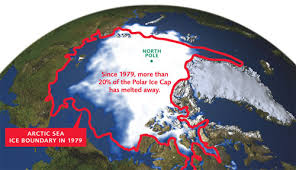By Ryan Marx
Climate Change:
It's a term we have all heard that can sometimes spark political emotions. However, it is hard to argue with science. The climate is changing and will continue to impact all countries, including America. Specifically, those who dwell in the Northwest region of the United States are experiencing changes that could dramatically alter their life.
What does this mean for Northwesters?
 Well, the world's temperature is increasing. It is predicted that the average temperature in the Northwest by 2080 will have a percentage margin of -10 degrees and + 20 degrees in relation to today's averages, which equates to an annual rise in average temperature of about 5.3 degrees in only 70 years (fws.gov all figures are in Fahrenheit). In geological terms, this change occurs in an instance. To put this in perspective, a data survey performed by G.C. Wiles, R.D. D'Arrigo, and G. C. Jacoby in 1996 notes that the average temperature in 1752 was 54.9 degrees and then in 1983 (a difference of 250 years) it had increased to 55.67; a difference of only .77 degrees.
Well, the world's temperature is increasing. It is predicted that the average temperature in the Northwest by 2080 will have a percentage margin of -10 degrees and + 20 degrees in relation to today's averages, which equates to an annual rise in average temperature of about 5.3 degrees in only 70 years (fws.gov all figures are in Fahrenheit). In geological terms, this change occurs in an instance. To put this in perspective, a data survey performed by G.C. Wiles, R.D. D'Arrigo, and G. C. Jacoby in 1996 notes that the average temperature in 1752 was 54.9 degrees and then in 1983 (a difference of 250 years) it had increased to 55.67; a difference of only .77 degrees.
So, if these predictions are correct: in the last 250 years the average temperature rose
.77 degrees, and in the next 70 years it will rise 5.3 degrees.
This should create concern amongst those living in the Northwest region! Until doing research on climate change I was naive in thinking that my home is not and would not be impacted by climate change. And even if a little increase in temperature happened, it could only help the Northwest right? Wrong!
Let me explain why global climate change matters in the Northwest:
A misconception: This rise in temperature would help Oregon's, Washington's and parts of Canada's beaches to compete with Florida's and California's beaches due to a rise in average temperature. Although this would be nice, it is not entirely true. There would actually be no more beaches that we know of today. By 2100, it is estimated that the sea levels will rise between 2.6 and 6.6 feet by the Intergovernmental Panel on Climate Change’s Fourth Assessment. This is due to rising temperatures melting ice caps, thus increasing sea levels. Also, many of the once fresh water sources in the Northwest will become increasingly salty as seawater invades freshwater wetlands.
 Declining springtime snow-pack leads to reduced summer stream flows and straining water supplies. This is happening now, and will continue to decrease our stream flows. The amount of water flowing in streams and rivers has been significantly altered in nearly 90 percent of waters that were assessed in nationwide USGS survey. "Flows are altered by a variety of land and water-management activities, including reservoirs, diversions, subsurface tile drains, groundwater withdrawals, waste water inputs, and impervious surfaces, such as parking lots, sidewalks and roads" according to usgs.gov.
Declining springtime snow-pack leads to reduced summer stream flows and straining water supplies. This is happening now, and will continue to decrease our stream flows. The amount of water flowing in streams and rivers has been significantly altered in nearly 90 percent of waters that were assessed in nationwide USGS survey. "Flows are altered by a variety of land and water-management activities, including reservoirs, diversions, subsurface tile drains, groundwater withdrawals, waste water inputs, and impervious surfaces, such as parking lots, sidewalks and roads" according to usgs.gov.
Wildfires will increase due to the higher temperatures especially in summer. This is proven to have already gone into effect with an increased frequency and intensity of wildfires in the past 50 years. It is projected to triple by 2080, further taking away the Northwest's remarkable landscapes.
Forests will dramatically die backwards. Studies have shown that due to rising temperatures, drought will occur and create stress in trees and effect soil moisture allowing for a decrease in forest growth. This will affect all species living in and around forested areas.
Coastal and Marine Environments will experience harsher conditions. These environments will increase vertical stratification of the water column (which is vital for the marine food chain) and the intensity and timing of coastal winds will start upwelling. Upwelling would also impact the current effective food webs.
While these changes may not matter or change our way of life right now, they will for future generations, and ARE impacting individuals who are dependent on stream flows, forests, beaches, and wildlife today. This is why those residing in the Northwest should care about climate change, and not just in our own backyard, but care in a global sense as well. This is because everyone is going through the same change no matter how different or more severe the consequences are or will become.

